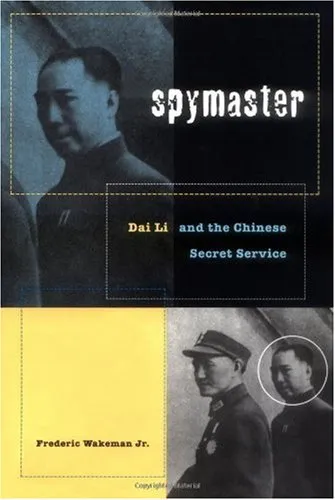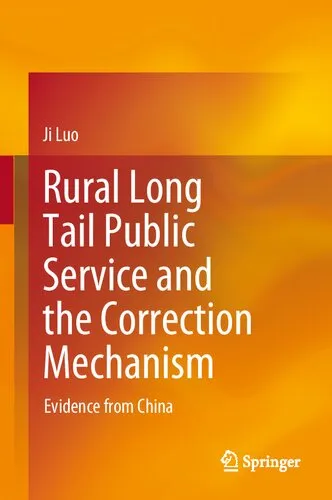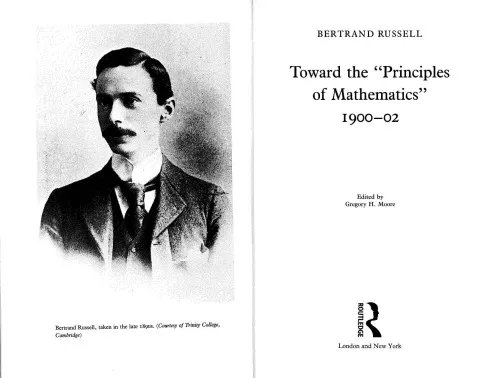Spymaster: Dai Li and the Chinese Secret Service (A Philip E. Lilienthal Book in Asian Studies)
4.5
بر اساس نظر کاربران

شما میتونید سوالاتتون در باره کتاب رو از هوش مصنوعیش بعد از ورود بپرسید
هر دانلود یا پرسش از هوش مصنوعی 2 امتیاز لازم دارد، برای بدست آوردن امتیاز رایگان، به صفحه ی راهنمای امتیازات سر بزنید و یک سری کار ارزشمند انجام بدینکتاب های مرتبط:
معرفی کتاب: Spymaster: Dai Li and the Chinese Secret Service
کتاب Spymaster: Dai Li and the Chinese Secret Service (A Philip E. Lilienthal Book in Asian Studies) اثر برجسته «فردریک واکمن جونیور»، یکی از آثار برجسته تاریخی است که جنبهای کمتر شناختهشده از تاریخ معاصر چین را بررسی میکند. این کتاب به زندگی و میراث "Dai Li"، رئیس مخوف سرویس مخفی چین، میپردازد و از نقش محوری او در شکلدهی ساختارهای امنیتی و اطلاعاتی رژیم ناسیونالیستی چین پرده برمیدارد. این اثر نهتنها یک بیوگرافی جذاب از شخصیت Dai Li است، بلکه یک تحلیل عمیق از تاریخ نظامی، سیاست و جامعه چین در قرن بیستم نیز ارائه میکند.
خلاصهای مفصل از کتاب
این کتاب داستان زندگی فردی را روایت میکند که اغلب بهعنوان "جیمز باند چین" شناخته میشود. Dai Li یک نابغه اطلاعاتی بود و بعدها تبدیل به یکی از موثرترین عوامل دولت Chiang Kai-shek شد. او در دوران جنگ جهانی دوم و درگیریهای داخلی چین نقشی کلیدی در استراتژیهای امنیت ملی و سرویس اطلاعاتی ایفا کرد.
نویسنده در این کتاب نشان میدهد که چگونه Dai Li توانست یک سیستم گسترده از جاسوسها، خبرچینها و عوامل امنیتی بسازد که هم به حفظ حکومت کمک کرد و هم به ایجاد هراس و وحشت عمومی منجر شد. کتاب همچنین به تعاملات پیچیده Dai Li با سازمانهای اطلاعاتی خارجی مانند OSS (Office of Strategic Services) و همکاریهای مخفیانه او پرداخته است.
نکات کلیدی کتاب
- دورنمایی از فعالیتهای اطلاعاتی در چین در نیمه اول قرن بیستم.
- تحلیل دقیق از روشهای Dai Li برای جمعآوری اطلاعات و استفاده از تکنیکهای جاسوسی.
- بررسی رابطه بین ساختارهای اطلاعاتی داخلی چین و جاسوسی بینالمللی.
- نقش Dai Li در موفقیتها و شکستهای Chiang Kai-shek.
جملات معروف از کتاب
“Dai Li appeared as the quintessential spymaster—a man who thrived in the shadows and whose influence often exceeded the reach of the battlefield.”
“To understand the history of modern China, one must first understand the silent wars waged in the murky world of espionage and counter-espionage.”
چرا این کتاب اهمیت دارد؟
اثر Spymaster: Dai Li and the Chinese Secret Service از این جهت حائز اهمیت است که به یکی از بخشهای نسبتاً ناشناخته تاریخ معاصر میپردازد. Dai Li نهتنها شخصیت تأثیرگذاری در تاریخ چین بود، بلکه نمونهای منحصربهفرد از نحوه مدیریت سرویسهای اطلاعاتی در دورهای از تحولات سیاسی گسترده جهانی به شمار میرود. این اثر تحلیلی شیوا از تأثیر اطلاعات و جاسوسی بر سیاست داخلی و خارجی ارائه میدهد و برای مورخان، علاقهمندان به تاریخ امنیت، و محققان علوم سیاسی بسیار مفید است.
در نهایت، این کتاب به ما نشان میدهد که چگونه قدرت اطلاعاتی میتواند مسیر تاریخ را تغییر دهد و در عین حال، هزینههای انسانی و اخلاقی این قدرت را نیز برجسته میکند.
Introduction to Spymaster: Dai Li and the Chinese Secret Service
Spymaster: Dai Li and the Chinese Secret Service, authored by Frederic Wakeman Jr., is a compelling and meticulously researched exploration of an enigmatic figure in Chinese history—Dai Li. Often referred to as "China's Himmler" or "the Chinese James Bond," Dai Li was the head of Chiang Kai-shek's secret police during a tumultuous and defining era in China’s past. This book not only delves into Dai Li’s life and his role as a spymaster but also examines the socio-political context in which he operated, offering readers a vivid portrait of China during the Second World War, the Chinese Civil War, and the lead-up to the Communist Revolution.
By weaving together historical analysis with an engaging narrative, Frederic Wakeman Jr. provides a comprehensive look at how paranoia, political intrigue, and espionage shaped 20th-century China. Combining archives, personal records, and witness accounts, the book captures both the humanity and brutality of a man who worked from the shadows to safeguard his vision for modern China while ruthlessly suppressing dissent. Spymaster is an essential text for anyone interested in the history of espionage, modern China, or the complex dynamics of political power.
Detailed Summary of the Book
The book traces the life and career of Dai Li, whose real name was Dai Chunfeng. It begins with his early life, following his humble origins and his eventual rise through the ranks of the Kuomintang (KMT), or Chinese Nationalist Party, under Chiang Kai-shek’s patronage. Dai Li quickly became indispensable to Chiang as he organized the National Bureau of Investigation and Statistics (NBIS), China’s most feared secret service.
Wakeman details Dai Li’s mastery of espionage and his use of covert operations to foil communist plots, suppress dissent, and consolidate power for the KMT. The book examines his collaboration with international intelligence agencies, including the U.S. Office of Strategic Services (OSS), as Dai Li played an instrumental role in orchestrating espionage networks during World War II against the Japanese.
The narrative also addresses the darker aspects of Dai Li's reign—his use of fear, torture, and extrajudicial killings to maintain control. Wakeman does not shy away from these atrocities, presenting Dai Li as both a protector of the state and a man consumed by the logic of fear and violence. The book culminates in Dai Li’s mysterious death in 1946, exploring the possible causes and conspiracies behind it while reflecting on his legacy in shaping modern intelligence systems in China.
Key Takeaways
- A nuanced understanding of Dai Li as both a patriot and a ruthless enforcer of state power.
- Insight into the formative years of modern China and the pivotal role espionage played during this period.
- An analysis of the uneasy alliance between Dai Li’s NBIS and international intelligence agencies, particularly the OSS.
- A broader commentary on the ethics and mechanics of state surveillance, fear, and political loyalty.
Famous Quotes from the Book
"Espionage is the invisible chessboard of power, where losses and gains are rarely acknowledged but always felt."
"Dai Li operated not from the shadows but as the shadows themselves—elusive, omnipresent, and ultimately inseparable from the framework of the state."
Why This Book Matters
Spymaster is not merely a historical biography—it is a critical inquiry into the costs of political power, the ethics of surveillance, and the lengths to which leaders will go to protect their regimes. At its core, it challenges readers to grapple with the moral grey zones of intelligence work and governance.
By presenting Dai Li in all his complexity, Wakeman compels us to reflect on the intersection of individual agency and historical forces. For scholars of Asian studies, historians, and those passionate about the history of espionage, this book offers unparalleled depth and insight. Its relevance extends beyond history, shedding light on the timeless themes of fear, loyalty, and state control that are as pressing today as they were during Dai Li's time.
دانلود رایگان مستقیم
شما میتونید سوالاتتون در باره کتاب رو از هوش مصنوعیش بعد از ورود بپرسید
دسترسی به کتابها از طریق پلتفرمهای قانونی و کتابخانههای عمومی نه تنها از حقوق نویسندگان و ناشران حمایت میکند، بلکه به پایداری فرهنگ کتابخوانی نیز کمک میرساند. پیش از دانلود، لحظهای به بررسی این گزینهها فکر کنید.
این کتاب رو در پلتفرم های دیگه ببینید
WorldCat به شما کمک میکنه تا کتاب ها رو در کتابخانه های سراسر دنیا پیدا کنید
امتیازها، نظرات تخصصی و صحبت ها درباره کتاب را در Goodreads ببینید
کتابهای کمیاب یا دست دوم را در AbeBooks پیدا کنید و بخرید
سوالات پرسیده شده از این کتاب
1692
بازدید4.5
امتیاز0
نظر98%
رضایتنظرات:
4.5
بر اساس 0 نظر کاربران
Questions & Answers
Ask questions about this book or help others by answering
No questions yet. Be the first to ask!























